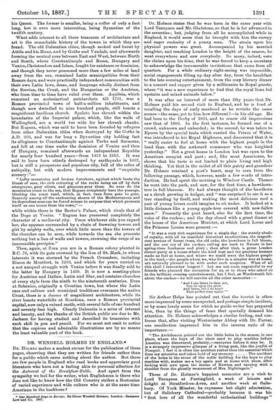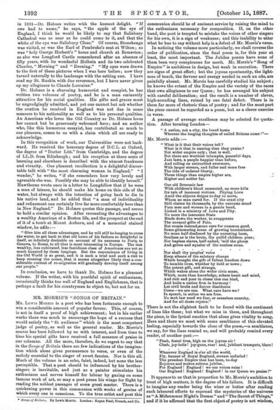DR. WENDELL HOLMES IN ENGLAND.*
Da. HOLMES makes a modest excuse for the publication of these pages, observing that they am written for friends rather than for a public which cares nothing about the author. But there are few people in England who read books and appreciate good literature who have not a feeling akin to personal affection for the Autocrat of the Breakfast-Table. And apart from the sympathy we feel for the writer, what Englishman is there who does not like to know how the Old Country strikes a Bostonian of varied experience and wide culture who is at the same time American to the backbone ?
.•Qs,v assists& „Mop ia Europe. By Oliver Wendell H.1.11011. Loudon; fianapen Low and Co. 1867.
Dr. Holmes states that he was born in the same year with Lord Tennyson and Mr. Gladstone, so that he is far advanced in the seventies ; but, judging from all he accomplished while in England, it would seem that he brought with him the energy and eager curiosity of a young man. The strain upon his physical powers was great. Accompanied by his married daughter, and reaching London in the height of the season, he went everywhere and saw everybody. So many, indeed, were the claims upon his time, that he was forced to keep a secretary to acknowledge the innumerable invitations that came from all quarters. For a while ordinary sight-seeing was impossible, social engagements filling up day after day, from the breakfast to the late evening entertainment, from the cosy literary dinner to a concert and supper given by a millionaire to Royal guests, where "it was a new experience to find that the royal lions fed upstairs and mixed animals below."
It was after an interval of more than fifty years that Dr. Holmes paid his second visit to England, and he is fond of recalling the days of early manhood as he revisits the same scenes—the same, yet to him how different I—in his old age. He had been to the Derby of 1834, and to renew old impressions saw that of 1886. In the first instance, he formed one of a crowd, unknown and unheeded; in the second, he was taken to Epsom by the special train which carried the Prince of Wales, was introduced to his Royal Highness, and discovered that it is " really easier to feel at home with the highest people in the land than with the awkward commoner who was knighted yesterday." Not a great house in London but was open to the American essayist and poet ; and, like most Americans, he shows that his taste is not limited to plain Habig and high thinking. Yet that in the midst of all this gaiety and grandeur Dr. Holmes retained a poet's heart, may be seen from the following passage, which, however, needs a few words of intro- duction. He had spent the morning in Windsor Castle. Thence he went into the park, and saw, for the first time, a hawthorn- tree in full blossom. He had always thought of the hawthorn as a shrub growing in hedges, and "was surprised to see it as a tree standing by itself, and making the most delicious roof a pair of young lovers could imagine to sit under. It looked at a little distance like a young apple-tree covered with new-fallen snow." Presently the poet heard, also for the first time, the voice of the cuckoo; and the day closed with a great dinner at the house of the American Minister, at which Lord Lorne and the Princess Louise were present:— "It was a very rich experience for a single day the stately abode. of royalty, with all its manifold historical recollections, the magnifi- cent avenue of forest. trees, the old oaks, the hawthorn in full bloom, and the one cry of the cuckoo, calling me back to Nature in her spring-time freshness and glory; then after that, a great London dinner-party at a house .where the kind host and the gracious hostess made us feel at home, and where we could meet the highest people in the land,—the people whom we, who live in a simpler way at home, are naturally pleased to be with tinder such auspices. What of all this shall I remember longest ? Let me not seem ungrateful to my friends who planned the excursion for tie, or to those who asked on to the brilliant evening entertainment, but I feel, as Wordsworth felt. about the cuckoo—he will survive all the other memories • And I can listen to thee yet, Can lie upon the plain
And listen, till I do beget That golden time again."'
Sir Arthur Helps has pointed out that the tourist is often more impressed by some unexpected, and perhaps simple incident, or by some lovely scene for which no guide-writer has prepared him, than by the things of fame that specially demand his attention. Dr. Holmes acknowledges a similar feeling, and con- fesses that, after visiting Westminster Abbey with Dr. Farrar, one recollection impressed him in the inverse ratio of its importance:—
" The Archdeacon pointed oat the little holes in the atones, in one place, where the boys of the choir used to play marbles before America was discovered, probably,--centuries before it may be. It is a strangely impressive glimpae of a living past, like the graffiti of Pompeii. I feel it is often the accident rather than the essential which
fixes my attention and takes held of my memory The accident of the holes in the stone of the noble building for the bays to play marbles with, makes me a boy again and at home with them, after looking with awe upon the statue of Newton and turning with a. shudder from the ghastly monument of Mrs. Nightingale."
Three of Dr. Holmes's happiest memories are a visit to Lord Tennyson at Farringford, a week of leisure and delight at Stratford-on-Avon, and another week at Salis- bury. Of York Minster, he expresses bat slight admiration, but of Salisbury Oathedral—probably because it was his " first love of all the wonderful ecclesiastical buildings"
in 184—Dr. Holmes writes with the keenest delight. "If one had to name," he says, "the apple of the eye of England, I think he would be likely to say that Salisbury Cathedral was as near as he coed come to it, and that the white of the eye was Salisbury Close." Of course, Stonehenge was visited, so was the Earl of Pembroke's seat at Wilton ; so was "holy George Herbert's" home and church at Bemerton ; so also was Longford Castle remembered after an absence of fifty years, with its wonderful Holbein and its two celebrated .Claudes, " Morning " and "Evening." "My eyes were drawn to the first of these pictures when I was here before; now they turned naturally to the landscape with the setting sun. I have read my St. Ruskin with due reverence, but I have never given up my allegiance to Claude Lorraine."
Dr. Holmes is a charming humourist and essayist, be has written two volumes of poetry, and he is a man eminently attractive for his social qualities. His gifts and graces must be ungrudgingly admitted, and yet one cannot but ask whether the ovation he received in England was not due in some measure to his nationality as well as to his personal qualities. An American who loves the Old Country as Dr. Holmes loves her cannot but be generously welcomed here; and an author who, like this humorous essayist, has contributed so much to our pleasure, comes to as with a claim which all are ready to acknowledge.
In this recognition of work, our Universities were not back- ward. He received the honorary degree of D.C.L. at Oxford, the degree of "Doctor Litt." from Cambridge, and the degree of LL.D. from Edinburgh ; and his reception at these seats of learning and elsewhere is described with the utmost frankness and vivacity. One pleasant recollection is a delightful dinner- table talk with "the most charming woman in England." "I wonder," he writes, "ii she remembers how very lovely and agreeable she was. Possibly she may be able to identify herself!' Hawthorne wrote once in a letter to Longfellow that if he were a man of leisure, he should make his home on this side of the water, but always with the intention of going back to die in his native land, and he added that "a man of individuality and refinement can certainly live far more comfortably here than in New England." Dr. Holmes quotes this passage, and seems to hold a similar opinion. After recounting the advantages to a wealthy American of a Boston life, and the prospect at the end of it of a tomb at Mount Auburn, and of a memorial stained window, he adds :—
" Give him all these advantages, and he will still be longing to cross the water, to get back to that old home of his fathers so delightful in itself, so infinitely desirable on account of its nearness to Paris, to -Geneva, to Rome, to all that is most interesting in Europe. The less wealthy, less cultivated, less fastidious class of Americans are not no much haunted by these longings. But the convenience of living in the Old World is so great, and it is such a trial and each a risk to keep crossing the ocean, that it seems altogether likely that a con-
siderable current of re-migration will gradually develop itself among Our people."
In conclusion, we have to thank Dr. Holmes for a pleasant volume. If the writer, with his youthful spirit of enthusiasm, occasionally thinks too well of England and Englishmen, that is perhaps a fault for his countrymen to object to, but not for us.



































 Previous page
Previous page